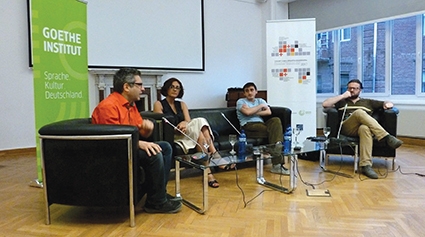The Meaning of ‘Border’
Earlier this month, the discussion ‘Borders in Everyday Life’ took place within the scope of the Georgian-German Year at Goethe Institute. Lasha Bakradze, Director of the Giorgi Leonidze Georgian State Literature Museum; Irakli Khvadagiani, historian, researcher of Soviet research laboratory ‘Sovlab;’ and Tamar Tsopurishvili, Professor at Ilia State University, took part. The moderator was Zaal Andronikashvili, scientist-collaborator of the Berlin Literature and Culture Research Center. The main focus was made on where Europe ends and Asia begins.
What influences do borders make and who actually makes them? What kind of borders do we have in everyday life? Where were the frontiers of the former Soviet Union and where are they today? These are the essential questions that surround the lengthy creative project ‘Border’, which is being implemented by the Goethe Institute and its numerous partners 2017-2018. The discussion was called ‘Of Black Box Recorder, Karaoke, National Anthem and Blurred Lines‘.
Thibaut de Ruyter, world-famous curator, Parhad Parzaliev, an artist from Azerbaijan, and Lali Pertenava, Georgian art researcher, also took part in the discussion. The debates were about the western and eastern influences on the Post Soviet cultural space. It also touched on personal and political narratives, identity and hybridity, as well as humor and social traumas.
The project ‘Border’, which represents an exhibition of contemporary visual artists (on at History Museum Karvasla, as a group expo, in which 24 works of around 30 young artists are displayed), as well as panel discussions, is being held by the Goethe Institute in Saint Petersburg, Moscow, Krasnoyarsk, Kiev, Minsk, Tbilisi, Dortmund and Middle Asia with the support of the German Ministry of Foreign Affairs. The aim of the exhibition is to express the attitudes towards different kinds of understanding of borders that exist in the world, including territorial borders as well as the border as a cultural, private or social divisor, creating a dichotomy between the concepts of ‘ours’ and ‘yours’.
“We’re celebrating two centennials: since the first German colonists arrived in Georgia and the establishment of bilateral diplomatic ties 25 years ago,” said Monika Lenhard, Vice Ambassador of Germany to Georgia. “We also mark the 25th anniversary of the cooperation of development policies as well as military policies. We want to show the relationships that we had during the past centuries and to look to the future, outlining new plans for better bilateral cooperation. We have perfectly cooperated with the Georgian Ministry of Foreign Affairs and well as with the Ministry of Culture. It means that our relationship enjoys not only a common past but also a dynamic development for the future,” she said , adding their desire to demonstrate the full spectrum of collaboration, be it political or people-to-people relations.
The Ambassador went on to announce ‘Bolnisoba,’ a public holiday in the town of Bolnisi in Kvemo Kartli, which was once the settlement most populated by Germans. The holiday will be held on October 7-8.
“We can say that we have a firework of events. More importantly, we are going to Batumi, which means that we also cover the regions with our program,” said Barbara Von Munchausen, New Director of Goethe Institute. “For us, the most important chord is Sasha Waltz’s Dance Theater tour on October 20-21. Before that, we also have a very interesting event on October 15 at Free University called ‘Children’s University’- a number of lectures and events addressed to children. It is associated with the children’s TV show in Germany called ‘Together with a Mouse’. The kids can find answers to their endless questions on our website, too. I’m very grateful for this celebratory year as it gives us a diversity to offer spectators. We are already busy selecting topics for Frankfurt (Note: Georgia will be represented at the biggest international book fair as an honorary guest in 2018). We hope that this book fair will boost further ideas and impulses for Georgian and German authors,” she said.
“We can understand the word border in completely different ways. However, this word has a particularly painful hue for Georgia today as our borders, our imagination and reality, are totally different from one another. I think it was not uninteresting for society to listen to the diverse range of this word’s meanings,” Bakradze said after the discussion, adding that it is difficult to define whether Georgia is Europe or Asia even for foreigners. Georgia claims that it was a part of the antique world. In Bakradze’s words, it is Europe because it is a Christian country. He believes that linguistically, we are more inclined to oriental influences, but speaking from political values, we more belong to Europe. Paradoxically enough, there was a great Persian influence in the Antique Era as well as in the Middle Ages. So, our merged culture is quite obvious and understandable.
Maka Lomadze












